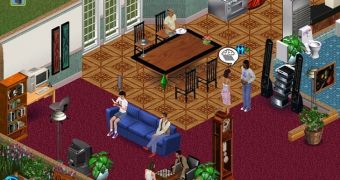The Sims has been considered the poster child for support of equal representation and same-sex relationships, scoring very favorably with the LGBT community and being offered as a shining example in the recent Tomodachi Life debacle.
But lo and behold, it seems that same-sex relationships were originally cut from the game by the angry pitchfork mob within EA and only made their way back into Maxis' life simulation game The Sims by accident.
Speaking with The New Yorker, Patrick J. Barrett III, a programmer on The Sims, has revealed that the feature only crept its way in because he was given an old design document when tasked with the implementation of social interactions between the Sims.
According to him, management was already a bit hostile toward the project as a whole, and consequently the team decided not to include same-sex relationships in the game in order to maintain support for the game and not stir any more trouble.
But the old document still included gay relationships, which led to having two female Sims exchange some feisty smooches during the game's reveal at E3 1999, and the positive feedback received from everyone prompted the company to keep the feature.
The E3 demo showcased a wedding event attended by a rather large crowd of virtual people, and it didn't feature scripted behavior for every Sim present there. As such, the unexpected scene showing two female characters overcome by the romance of the wedding became one of the shows' prominent talking points.
In order to control the way Sims would fall in love with each other, Barrett created a system that would determine their sexuality through the user's actions, rather than simply through shallow factors such as proximity.
The system allowed Sims to be either heterosexual, homosexual or bisexual, and the game kept track of certain social interactions that were tagged as romantic, taking note of whether these were performed by same-sex or opposite-sex Sims. Over time, once a Sim developed a relationship, his or her preference was set.
"EA was more worried that The Sims would flop and hurt the SimCity franchise. It was also a different time; people weren't so violently for or against same-sex relationships. They didn't go out of the way to find it and react to it. The right-wing press didn't have the platform they have today to scream. There was no Twitter, no Facebook, no blogs. I kinda hoped people would come at night with pitchforks and torches. But it never happened," Barrett says.
Probably one of the best things about The Sims was that the inclusion of same-sex relationships ended up being non-controversial, and the game became very successful based solely on its merits.
The next entry in the popular Sims franchise, The Sims 4, is set to launch on September 2, for Windows PC and Mac. The upcoming game's main draws are some very powerful Create a Sim and Build Mode editors, affording player much more versatility in the creation of their own content.

 14 DAY TRIAL //
14 DAY TRIAL //